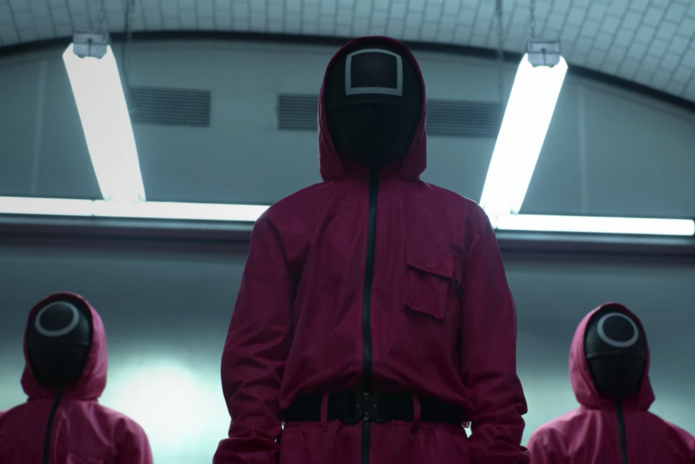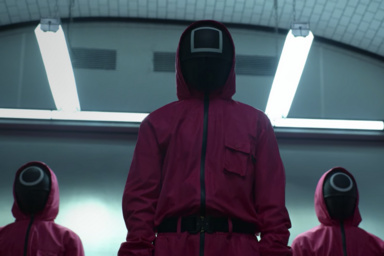Although Netflix’s newest critically-acclaimed television show Squid Game has been all the rage since its global premiere on September 17, one common criticism from fans is about Squid Game’s translation issues.
The issue of mistranslation in Squid Game first gained traction when comedian Youngmi Mayer took to Twitter, writing in a now-viral tweet, “not to sound snobby but i’m fluent in korean and i watched squid game with english subtitles and if you don’t understand korean you didn’t really watch the same show. translation was so bad. the dialogue was written so well and zero of it was preserved.”
Mayer then hopped over to TikTok to dissect a majorly mistranslated scene featuring one of the characters, Mi-nyeo. In the scene Mayer shows, Mi-nyeo is trying to convince the other players to play one of the games with her. According to the English subtitles, she tells them, “I’m not a genius, but I still got it work out. Huh?” Not only does the subtitle not make any sense grammatically, but the meaning is also completely different from what Mi-nyeo actually said. According to Mayer, what Mi-nyeo actually said was, “I am very smart, I just never got the chance to study,” which Mayer then explains is a common trope in Korean popular media. Thus, not only do Netflix’s mistranslations distort the meaning of what the characters are actually saying, but it also does not accurately represent Korean culture.
Not only do Netflix’s mistranslations distort the meaning of what the characters are actually saying, but it also does not accurately represent Korean culture.
In an article for The Guardian, writer Viv Groskop presents another example of a key mistranslation in the show. According to the English subtitles, one of the characters says in episode eight, “You always get in trouble to know it’s trouble.” (Yeah… I’m confused too.) However, Groskop explains, the real translation is actually a Korean expression: “You always eat it before you can tell whether it’s sh*t or doenjang [brown fermented soya bean paste].”
Unfortunately, the problem of mistranslation is not new for Netflix. Netflix’s popular Spanish crime drama Money Heist, or La Casa de Papel, experienced a similar problem with its murky Spanish-to-English translations. In a Reddit thread, fans complained about the botched subtitles in Money Heist and how they completely distorted the meaning and plot of the show. One fan wrote, “The subs tell a wholly different story, [and] the vibe is not the same.”
And what about Neon Genesis Evangelion? Back in 2019, the 1995 anime classic hit Netflix’s streaming site, only to leave fans in an outrage over the inaccurate translations. In an image, one Twitter user shared a stark difference between the translations, with the subtitles on the right side being the new Netflix translation and the left side being the old, correct translation. For instance, the first example shows one of the characters saying, “It means I love you,” which is the correct translation; yet on the right side, which is Netflix’s incorrect translation, the character apparently says, “It means I like you.” Although this is a one word difference between “love” and “like,” the meaning of these two sentences is entirely different and can impact viewers’ understanding of the scene.
Why doesn’t Netflix, which is worth billions of dollars, use its profits to hire better translators and make foreign shows and movies more easily accessible to viewers?
Oftentimes, many Japanese-to-English translations in popular anime shows on Netflix are completely mangled, and fans are perpetually disappointed by the streaming service’s unwillingness to fix the mistranslations. One user on Twitter wrote, “don’t watch anime on netflix. their sub translations are so bad. 😰” Another user quote-tweeted one of Mayer’s tweets about the poor translations in Squid Game and wrote, “this happens in anime and manga too it’s so frustrating!!! netflix anime subtitles are so bad and I’m not even fluent in Nihonggo and I also found that manga fan translations >>>>> official translations.”
So why doesn’t Netflix fix this problem and actually listen to consumers? Why doesn’t Netflix, which is worth billions of dollars, use its profits to hire better translators and make foreign shows and movies more easily accessible to viewers?
According to Mayer, the answer is upsetting yet simple: “i want to point out that the reason this happens is because translation work is not respected and also the sheer volume of content. translators are underpaid and overworked and it’s not their fault. it’s the fault of producers who don’t appreciate the art.”
Subtitle translators are tremendously underpaid and undervalued for their work and skillset.
Although Netflix announced in 2017 that it was looking to hire more translators to improve their subtitle accuracy and provide more translation offerings for viewers through HERMES, an online subtitling and translation test, the company’s trend of mistranslations perhaps suggests failure in this endeavor. The other issue lies in the fact that some subtitle translators are tremendously underpaid and undervalued for their work and skillset. According to Indeed, translators are typically paid around $45,000 per year.
The fact of the matter is that Netflix needs to do better and set an example as one of the leading streaming services in the globe, and audiences need to continue to demand better from this billion-dollar company that can absolutely afford hiring more and better translators. If Netflix truly cared about making their content more easily accessible for viewers everywhere, they would.


